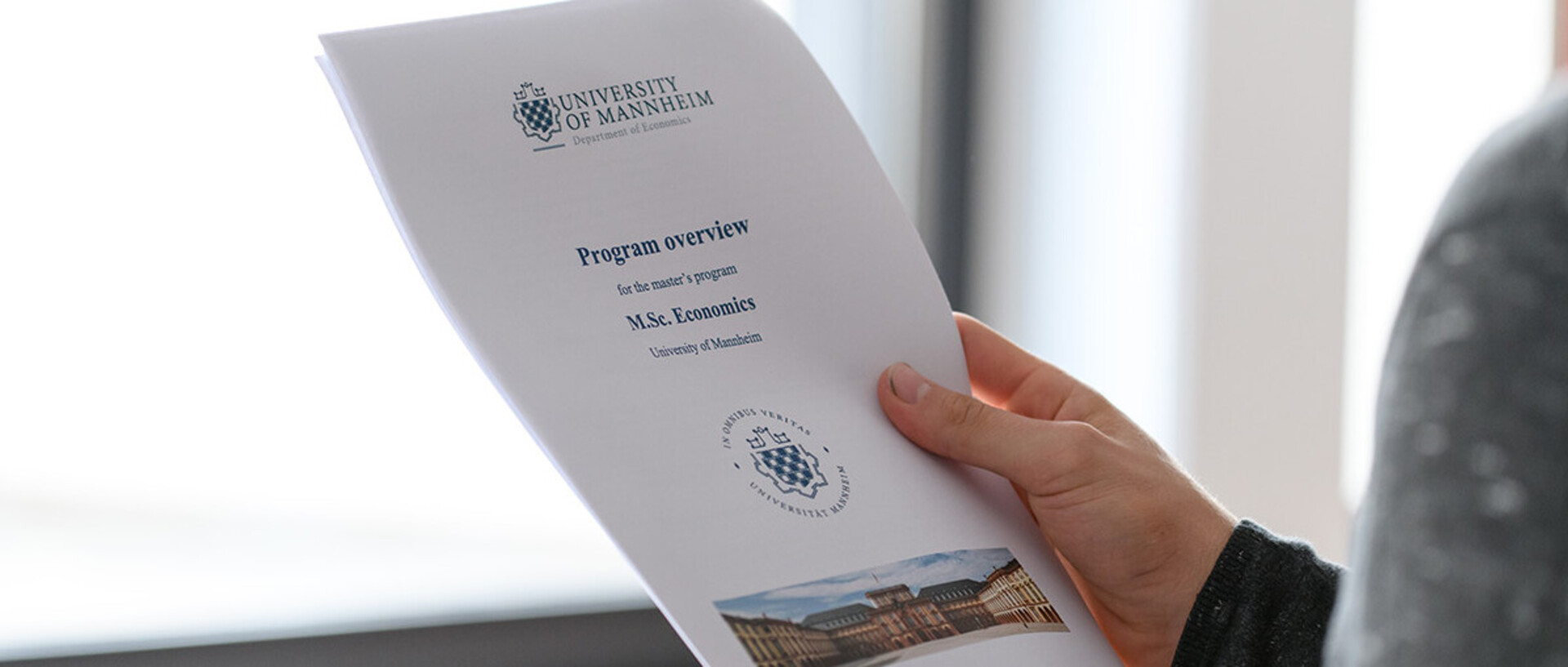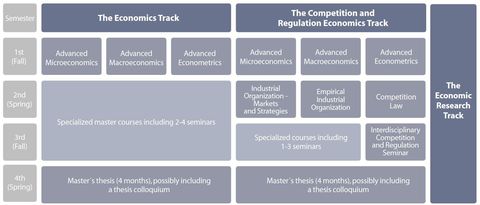General Structure of the Master`s Program
The master's program in Economics lasts two academic years (four semesters), and always starts in the fall semester (September). The language of administration and instruction is English. Upon successful completion of the program, you are awarded a Master of Science (M.Sc.).
Introductory Phase
After a two-week orientation phase, you can choose to take courses in the Economics module or attend the Economic Research Preparatory Courses, which are required to apply for the Economic Research track at the end of the first semester.
Economics: · E600 Mathematics (optional) · E601 Advanced Microeconomics · E602 Advanced Macroeconomics · E603 Advanced Econometrics | Economic Research Preparatory Courses (at doctoral level): · E700 Mathematics for Economists · E701 Advanced Microeconomics · E702 Advanced Macroeconomics · E703 Advanced Econometrics |
Specialization Phase
After the introductory phase you continue in one of three study tracks: Economics, Competition and Regulation Economics (CaRE), or Economic Research.
The Economics track gives you the opportunity to build a unique profile from a wide range of elective courses, including courses from other departments such as Business Mathematics, Political Science or Sociology. You can also attend courses from the Department of Economics at Heidelberg University.
In the CaRE track electives are complemented by tailor-made courses in the fields of competition policy and regulation economics. Furthermore, there are a number of opportunities for internships, field trips, and other forms of collaboration with our partners.
The study track Economic Research allows outstanding students to enter into a fast-track program for acquiring a doctorate. Application to this track requires successful attendance of the introductory modules of the module combination „Economic Research Preparatory Courses“ with an average grade weighted in ECTS credits of at least 2.5 and a positive assessment of the candidate by the examination committee.
Fields of Study
Research Phase
The master’s thesis may be registered in the fourth semester at the earliest. Candidates must have completed at least one (block)seminar and have obtained at least 45 ECTS credits during the specialization phase. The choice of a supervisor and topic is within the responsibility of the candidate. The regular period of completion is four months.
Internship and Exchange Opportunities
There are excellent opportunities for students of the master's program in Mannheim to gain experiences in different environments:
Students of the Economics track can choose to participate in the ENTER Program, a double degree exchange program with Europe’s leading economics departments. The University of Mannheim collaborates with the Universidad Carlos III de Madrid, Stockholms Universitet, and the Université de Toulouse I. The university also has a large number of excellent Erasmus and overseas partnerships.
As part of the Competition and Regulation Economics track, we facilitate internships and collaborations with our cooperation partners. Several partners give students the option of writing their master’s thesis within the company. Cooperation agreements already exist with the CRA, CompassLexecon, Competition & Consumer Commission of Singapore, Deutsche Bahn, German Monopolies Commission, Oxera, Nera, NetzeBW, and the Centre for European Economic Research (ZEW). Internships fulfilling the requirements of the examination regulations may be recognized for credit as part of the specialization phase. For more information please visit the study guide section.
The Economic Research track does not directly include any exchange opportunities. Instead, students of this track have the opportunity to go abroad during their subsequent doctoral studies at the Center for Doctoral Studies in Economics (CDSE). The CDSE is included in the European Network for Training in Economic Research (ENTER), a collaboration between the Universitat Autonoma de Barcelona, the Université Libre de Bruxelles, University College London, the Universidad Carlos III de Madrid, the University of Mannheim, the University of Stockholm & Stockholm School of Economics, Tilburg University, and the Université de Toulouse 1.
For some exchange destinations, access may be competitive. The programs are subject to the ongoing approval by our partner universities and the German Academic Exchange Service (DAAD). Additionally, students can apply for a variety of other exchange opportunities (e.g. the ERASMUS+ program) at one of the University of Mannheim's partner universities.

